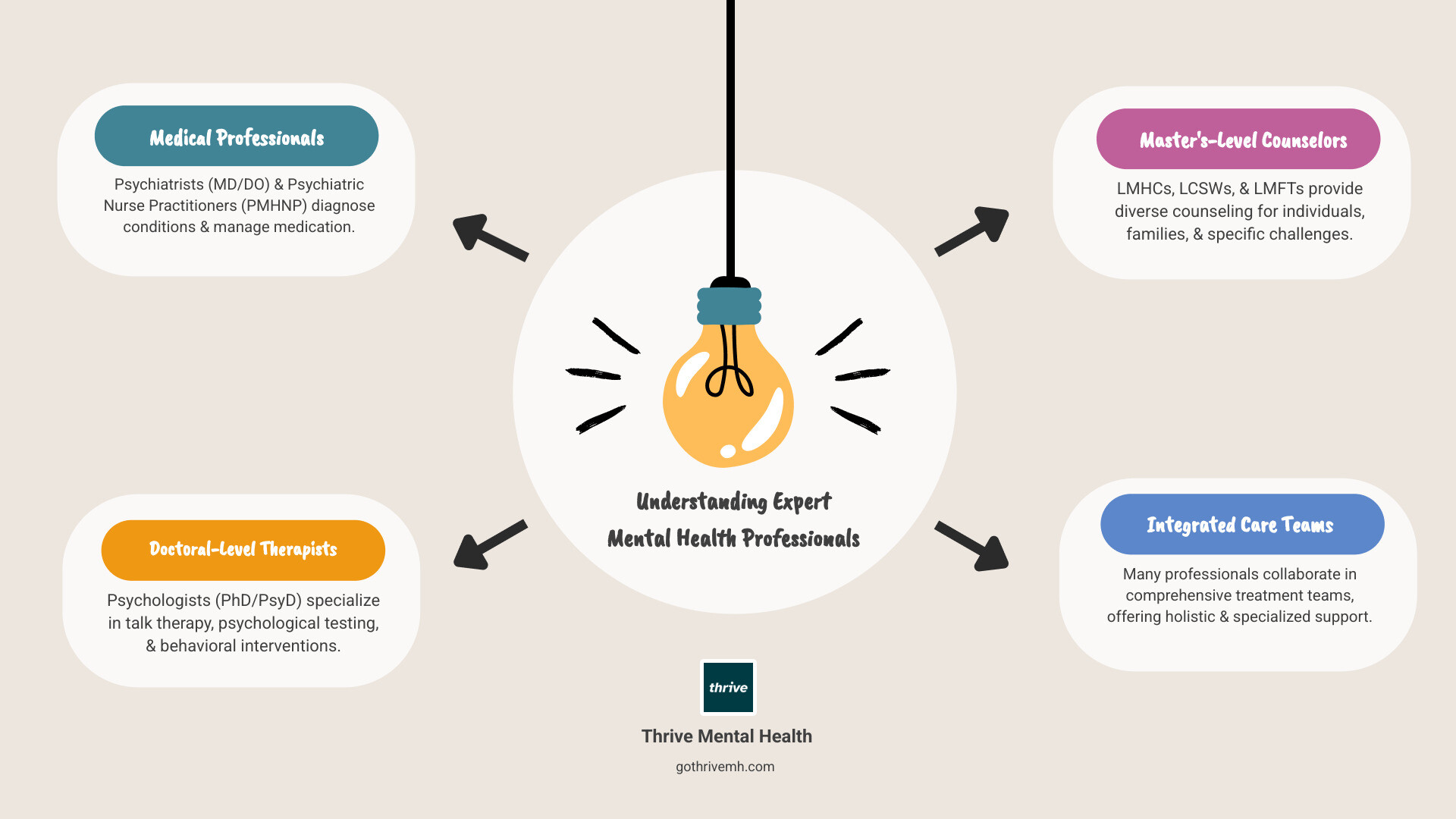Therapists, Psychiatrists, and More—Oh My! Understanding Mental Health Professionals

Why Understanding Mental Health Professionals Matters
Expert mental health professionals come in many forms, each with unique training, specializations, and approaches to care. Whether you’re dealing with anxiety, depression, or other mental health challenges, knowing who does what can save you time, money, and frustration.
Quick Guide to Expert Mental Health Professionals:
- Psychiatrists (MD/DO) – Medical doctors who diagnose and prescribe medication
- Psychologists (PhD/PsyD) – Doctoral-level therapists specializing in talk therapy and testing
- Licensed Mental Health Counselors (LMHC) – Master’s-level therapists for individual counseling
- Licensed Clinical Social Workers (LCSW) – Therapists with social work training and case management
- Licensed Marriage & Family Therapists (LMFT) – Specialists in relationship and family dynamics
- Psychiatric Nurse Practitioners (PMHNP) – Advanced nurses who can diagnose and prescribe
The mental health field includes more than 654,000 professionals across different specialties. Each brings specific skills to help you feel better and function at your best.
Understanding these roles helps you find the right fit faster. Some focus on medication management, others on talk therapy, and many work as part of comprehensive treatment teams.
I’m Nate Raine, CEO of Thrive Mental Health, where I’ve spent years building partnerships with expert mental health professionals across behavioral health and wellness sectors. My experience in healthcare strategy and mental health innovation has shown me how the right professional match can transform someone’s treatment journey.

The Core Team: Psychiatrists vs. Psychologists

Stepping into mental healthcare can sometimes feel a bit like learning a new language. You hear terms like “psychiatrist” and “psychologist” thrown around, often as if they mean the same thing. But here’s the secret: while both are incredibly important expert mental health professionals, they play very distinct roles in helping you feel your best.
Think of it this way: you wouldn’t call a plumber to fix your broken electrical panel, right? Both are experts who fix things around your home, but their skills are different. The same goes for psychiatrists and psychologists. Understanding these differences is key to finding the right support for your unique needs.
What is a Psychiatrist?
A psychiatrist is a medical doctor (MD or DO) who has gone through extensive training to specialize in mental health. After medical school, they complete a residency specifically in psychiatry. This means they have a deep understanding of how your brain, body, and overall physical health are connected to your mental well-being.
Because of their medical background, psychiatrists are uniquely qualified to diagnose mental illnesses and, very importantly, to prescribe medication. They often work with more complex or severe conditions, such as bipolar disorder, schizophrenia, or major depression, where medication can be a crucial part of the treatment plan. They can also order lab tests and consider how physical health might be impacting your mental state. While some psychiatrists do offer talk therapy, their main focus is usually on medication management. They often team up with other therapists to provide comprehensive care.
If you’re wondering about medication options for your mental health journey, our medication management online services can connect you with the right professionals.
What is a Psychologist?
A psychologist, on the other hand, holds a doctoral degree in psychology. This is typically either a Doctor of Philosophy (Ph.D.), which often includes a strong research focus, or a Doctor of Psychology (Psy.D.), which is more centered on clinical practice. Their training dives deep into how people think, feel, and behave from a scientific perspective.
The main tool in a psychologist’s toolkit is psychotherapy, also known as “talk therapy.” They use various evidence-based approaches to help individuals, couples, and families work through challenges like anxiety, depression, trauma, and relationship issues. Psychologists are also experts in psychological testing and assessment, which can be super helpful for diagnosing learning disabilities, ADHD, or other neurodevelopmental conditions. This testing helps understand your unique strengths and challenges.
A key difference is that, in most states, psychologists cannot prescribe medication. However, it’s worth noting that a handful of states in the U.S. (New Mexico, Louisiana, Illinois, Iowa, and Idaho) have special laws allowing licensed psychologists with extra, specialized training to prescribe a limited list of medications. To learn more about what a psychologist does, check out our resource on what is a psychologist?
Comparing Key Differences Between Psychiatrists and Psychologists
| Feature | Psychiatrist (MD/DO) | Psychologist (Ph.D./Psy.D.) |
|---|---|---|
| Education | Medical Doctor (MD or DO) + Psychiatric Residency | Doctoral Degree (Ph.D. or Psy.D.) in Psychology + Internship |
| Prescribing Authority | Yes, can prescribe medication | Generally no (exceptions in 5 US states with specialized training) |
| Primary Treatment | Medication management, medical evaluation, some therapy | Psychotherapy (talk therapy), psychological testing and assessment |
| Conditions Treated | Complex conditions requiring medication (e.g., bipolar disorder, schizophrenia, severe depression) | Wide range of conditions treated with therapy (e.g., anxiety, depression, PTSD, relationship issues) |
| Insurance Coverage | Often covered by medical insurance plans | Varies by plan; often covered for therapy services |
The Broader Spectrum of Expert Mental Health Professionals

While psychiatrists and psychologists often steal the spotlight, expert mental health professionals is actually much bigger and more colorful than you might think. It’s like finding that your favorite restaurant has a whole second menu you never knew existed!
Beyond these well-known roles, there’s an entire team of licensed professionals who bring their own special skills to the table. Each one offers a different lens through which to view and address mental health challenges. At Thrive Mental Health, we often work with this diverse group of professionals to create truly personalized care that fits your unique needs.
Think of it this way: if mental health care were a jazz band, psychiatrists and psychologists might be the lead instruments, but these other professionals are the rhythm section, backup vocals, and everything else that makes the music complete. For a deeper dive into how these different approaches work together, check out our guide on understanding the different types of mental health therapy.
Licensed Mental Health Counselor (LMHC)
A Licensed Mental Health Counselor comes to the field with a master’s degree in counseling or a related mental health area. These professionals are like skilled navigators who help you chart a course through life’s choppy waters.
LMHCs excel at individual and group counseling, helping people tackle specific challenges head-on. Whether you’re dealing with overwhelming stress, trying to change unhelpful behavioral patterns, or just need someone to help you make sense of your thoughts, an LMHC can be your guide.
What makes them particularly valuable is their focus on practical, everyday solutions. They’re not just there to listen (though they’re great at that too) – they’re actively working with you to develop stress management techniques and coping strategies you can actually use in real life.
In Florida, becoming an LMHC requires meeting strict standards for education and supervised practice, so you can trust you’re getting quality care. If you’re curious about the specific hoops these professionals jump through to get licensed, our resource on Florida Counseling Licensure Guidance Procedures has all the details.
Licensed Clinical Social Worker (LCSW)
A Licensed Clinical Social Worker brings something special to the table: they see the big picture. With their Master of Social Work (MSW) degree and extensive supervised clinical experience, LCSWs are like detectives who look at your whole life story, not just the chapter you’re currently struggling with.
They provide counseling and psychotherapy just like other therapists, but they also consider all the social and environmental factors that might be affecting your mental health. Are family dynamics causing stress? Is your living situation contributing to anxiety? Are there community resources that could help but you don’t know about them?
LCSWs are experts at connecting clients to resources and advocating for what you need. They might help you find housing assistance, steer workplace accommodations, or connect with support groups. They work everywhere – schools, hospitals, government agencies, and private practices – because mental health challenges don’t exist in a vacuum.
Licensed Marriage and Family Therapist (LMFT)
When relationships are the source of your stress (and let’s be honest, when aren’t they?), a Licensed Marriage and Family Therapist is your go-to professional. With their master’s degree and specialized training, LMFTs are like relationship translators who help people understand each other better.
While they can certainly work with individuals, their superpower lies in working with couples and families. They understand that sometimes the problem isn’t just “you” – it’s the dance between you and the people closest to you.
LMFTs specialize in communication and conflict resolution, helping families break out of those frustrating patterns where everyone keeps having the same argument over and over. They view mental health through the lens of family systems, recognizing that your well-being is often deeply connected to your relationships with others.
Psychiatric Nurse Practitioner (PMHNP)
Here’s where things get really interesting. A Psychiatric Mental Health Nurse Practitioner is like a Swiss Army knife in the mental health world – they can do a little bit of everything, and they do it well.
PMHNPs start as registered nurses, then pursue advanced nursing degrees (master’s or doctoral level) with a focus on psychiatric and mental health care. This unique background gives them a practical, hands-on approach to mental health that’s both medical and deeply human.
In Florida, PMHNPs have some serious credentials: they can diagnose mental health conditions and prescribe medication, just like psychiatrists. This makes them incredibly valuable, especially since there aren’t enough psychiatrists to go around in many areas.
What’s really cool about PMHNPs is how they work collaboratively with other professionals. They might prescribe your medication while you see a therapist for talk therapy, or work closely with your psychiatrist to fine-tune your treatment plan. They’re team players who help bridge the gap between medical and therapeutic care.
For more insights into how psychiatric nurses fit into the broader landscape of mental health care, our page on understanding the different types of mental health therapy offers additional context.
What Kind of Support Do You Need? Matching Services to Professionals
So, you’ve learned about the different expert mental health professionals. Now, how do you figure out which one is right for you? It’s like building a custom outfit—you need to know what you’re dressing for! Understanding your own needs is the first step toward finding the perfect fit. This section breaks down common mental health services and which professionals typically provide them, helping you find the right starting point.
For a Diagnosis or Medication
If your primary concern involves getting a formal diagnosis for a mental health condition, or if you believe medication might be a necessary part of your treatment plan, you’ll typically want to start with a medical professional.
- Psychiatrist: As medical doctors, psychiatrists are uniquely qualified to diagnose mental health disorders and prescribe and manage psychiatric medications. They can assess complex conditions and monitor how medications interact with your overall health.
- Psychiatric Nurse Practitioner (PMHNP): With their advanced nursing degrees, PMHNPs can also diagnose mental health conditions and prescribe medications, often working in close collaboration with psychiatrists. They offer a blend of medical and therapeutic care.
- Primary Care Physician (PCP): Your family doctor can be a great first point of contact. They can often diagnose common mental health disorders like depression and anxiety, and may prescribe initial medications. They are also excellent at providing referrals to specialists when more in-depth care is needed.
If you’re looking for medication management online that is convenient and accessible, these are the professionals who can provide that service.
For Talk Therapy and Counseling
If you’re looking to explore your feelings, develop coping strategies, work through past traumas, or improve your relationships, talk therapy is likely what you need. This is where the majority of expert mental health professionals shine.
- Psychologists: With their doctoral degrees, psychologists are highly skilled in various forms of psychotherapy. They use evidence-based treatments like Cognitive Behavioral Therapy (CBT), Dialectical Behavior Therapy (DBT), Interpersonal Therapy, and Psychodynamic Therapy to help you understand and change behavioral patterns. They are also adept at psychological testing for assessment and diagnosis.
- Licensed Mental Health Counselors (LMHCs), Licensed Clinical Social Workers (LCSWs), and Licensed Marriage and Family Therapists (LMFTs): These master’s-level professionals are primary providers of counseling. They specialize in different areas—LMHCs often focus on individual challenges, LCSWs on the interplay of social factors and mental health, and LMFTs on relationship and family dynamics. They all provide a safe, confidential space for you to explore issues and develop strategies for well-being.
There are many common types of therapy, each custom to different needs. For example, if you’re looking for an EMDR therapist to address trauma, or exploring neurodiversity-affirming therapy techniques, you’ll likely work with a psychologist, LMHC, LCSW, or LMFT. The goal of all these professionals is to help you transform your life through mental health therapy.
For Intensive Support
Sometimes, standard outpatient therapy isn’t enough, and a more structured, comprehensive approach is needed. This is where programs like Partial Hospitalization (PHP) and Intensive Outpatient (IOP) come in.
- Partial Hospitalization Programs (PHP): These are day treatment programs where clients attend therapy for several hours a day, multiple days a week, but return home in the evenings. They offer a high level of structured care without requiring an overnight stay.
- Intensive Outpatient Programs (IOP): IOPs offer a step down from PHP, providing structured therapy for fewer hours or days per week. They allow individuals to maintain their work, school, or family commitments while receiving significant support.
Both PHP and IOP involve a multidisciplinary team of expert mental health professionals, including psychiatrists (for medication management), psychologists, LMHCs, LCSWs, and LMFTs. This team-based approach ensures you receive comprehensive, coordinated care custom to your specific needs. At Thrive Mental Health, we specialize in providing flexible, expert-led, evidence-based IOP and PHP programs for adults and young professionals, accessible from anywhere in Florida, including Tampa Bay, St. Petersburg, and Central Florida. These programs are designed to provide the intensive support needed for significant progress. Learn more about the benefits of choosing professional treatment centers and understanding mental health facilities services.
How to Choose the Right Expert for You

Finding the right expert mental health professional is a lot like finding a good friend – you need someone who truly “gets” you. While their education and training are super important, that special connection you feel, often called the “therapeutic alliance,” can make all the difference in your journey. This section will walk you through some practical tips for finding someone who not only has the right credentials but also feels like a great fit for you.
What Defines an Expert Mental Health Professional?
So, what truly makes a mental health professional an “expert” beyond just having a degree? It’s a combination of things that ensure you’re getting top-notch care.
First and foremost, always check for licensure and credentials. This is absolutely non-negotiable. It means they’ve met strict educational and training standards set by the state. For example, if you’re in Florida, you’ll want to make sure they’re licensed by the appropriate board under the Florida Department of Health. This license is your guarantee of their professional standing.
Next, consider their years of experience. While new professionals can be fantastic, someone with many years in the field, like the 25+ years some experts in our research have, often brings a rich depth of understanding from seeing a wide range of situations. Also, look for specific specializations. Does their expertise match what you need? Whether it’s trauma, addiction, eating disorders, or relationship issues, finding someone with a proven track record in that area can be really helpful.
An expert also shows a clear commitment to evidence-based practices. This means they use treatments that have been proven to work through scientific research, like CBT, DBT, or EMDR. They’re also usually dedicated to continuous learning, staying up-to-date with the latest and best ways to help. Finally, adherence to ethical standards is key. Professionals should follow strict ethical codes, like those from the American Psychological Association (APA). This protects your safety, keeps your information private, and sets clear boundaries. If you ever feel judged or uncomfortable, that’s usually a sign to look elsewhere.
Finding Licensed Expert Mental Health Professionals in Florida
Since Thrive Mental Health serves folks across Florida, including Tampa Bay, St. Petersburg, and Central Florida, here’s how you can find expert mental health professionals in our sunshine state:
A great starting point is to check professional association directories. Organizations like the Florida Psychological Association, Florida Counseling Association, or the National Association of Social Workers (NASW) often have searchable lists of licensed professionals. You can also use your insurance provider’s search tool. Most insurance companies have online portals where you can easily find in-network providers by specialty and location. This is super important for understanding what your coverage might be.
Don’t forget to ask for a referral from your doctor. Your primary care physician is a fantastic resource. They often have trusted networks and can point you toward specialists who might be a great fit for your specific needs. And always, always verify licenses on the Florida Department of Health website. The Florida Department of Health’s MQA (Medical Quality Assurance) portal lets you search for and confirm the licenses of various healthcare professionals. It’s a quick way to ensure they’re legitimate.
Questions to Ask a Potential Therapist
Once you’ve narrowed down your search, it’s totally okay – and even encouraged! – to “interview” potential therapists. This helps you figure out if their style and personality click with yours.
When you connect with a potential therapist, don’t be shy about asking questions. You’ll want to know what their therapeutic approach is and what methods they typically use. For instance, do they lean towards CBT, psychodynamic therapy, or something else? Ask if they have experience working with concerns like yours, whether that’s anxiety, trauma, or relationship issues. It’s also helpful to understand what a typical session looks like so you know what to expect.
Money matters, so be sure to ask about their fees, if they accept your insurance, and if they offer a sliding scale. You might also want to know how long they typically work with clients for your specific concern, how they measure progress, and even their thoughts on medication if that’s something you’re considering. For more insights on this important decision, check out our guide on key considerations in choosing a mental healthcare provider. And remember, exploring virtual therapy options can really open up your choices, making it easier to find that perfect match.
It’s completely fine to try out a few different professionals before settling on “the one.” The main goal is to find someone with whom you feel comfortable, truly understood, and confident in their ability to guide you toward a better place.
Conclusion
Understanding the different types of expert mental health professionals is like having a roadmap when you’re lost – it shows you exactly where to go and who can help you get there. Throughout this guide, we’ve explored the rich landscape of mental health care, from psychiatrists who blend medical expertise with mental health treatment, to psychologists who dive deep into the science of human behavior, to the specialized counselors and therapists who bring their own unique perspectives to your healing journey.
Think of it this way: you wouldn’t call a plumber to fix your electrical problems, right? The same principle applies to mental health care. A psychiatrist’s medical training makes them your go-to for complex diagnoses and medication management, while a licensed marriage and family therapist specializes in untangling relationship dynamics that might be affecting your well-being. Licensed mental health counselors, clinical social workers, and psychiatric nurse practitioners each bring their own expertise to the table, creating a comprehensive support system designed around your specific needs.
The beauty of today’s mental health landscape is that you have options. Whether you’re dealing with anxiety that keeps you up at night, depression that makes daily tasks feel overwhelming, or relationship issues that seem impossible to resolve, there’s an expert mental health professional trained specifically to help with your situation.
At Thrive Mental Health, we understand that finding the right professional can feel overwhelming – that’s exactly why we’ve built our programs around connecting you with the right experts for your unique situation. Our virtual and in-person intensive outpatient and partial hospitalization programs bring together teams of expert mental health professionals who work collaboratively to create evidence-based treatment plans custom just for you.
Whether you’re in Tampa Bay, St. Petersburg, Central Florida, or anywhere else in Florida, you don’t have to steer this journey alone. Our flexible approach means you can access expert care from wherever feels most comfortable, whether that’s your living room or one of our welcoming treatment spaces.
Taking that first step toward better mental health isn’t just brave – it’s smart. You deserve to feel better, function at your best, and live the life you want. The right professional is out there, ready to guide you through evidence-based treatments that actually work.
Ready to explore your options? Explore remote mental health support options and find how the right expert can transform your mental health journey today.
